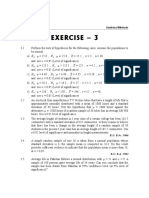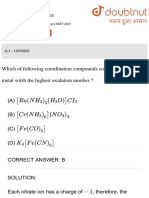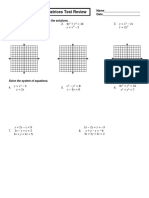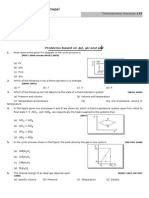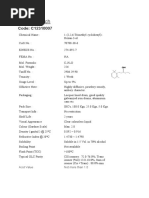Tutorial 2 Questions
Uploaded by
ivecoTutorial 2 Questions
Uploaded by
iveco1.
Calculate H for the reaction: NH3(g) + HCl(g) -----> NH4Cl(s)
Given that:
½N2(g) + 1½H2(g) -----> NH3(g) H = -46.1 kJ/mol
½H2(g) + ½Cl2(g) ------> HCl(g) H = -92.3 kJ/mol
½N2(g) + 2H2(g) + ½Cl2(g) -----> NH4Cl(s) H = -314.4 kJ/mol
[Ans: H = -176.0 kJ/mol]
2. Calculate H for the reaction: C2H4 (g) + H2 (g) C2H6 (g), from the following data.
C2H4 (g) + 3 O2 (g) 2 CO2 (g) + 2 H2O (l) H = -1411. kJ
C2H6 (g) + 3½ O2 (g) 2 CO2 (g) + 3 H2O (l) H = -1560. kJ
H2 (g) + ½ O2 (g) H2O (l) H = -285.8 kJ
[Ans: H = -137 kJ]
3. Calculate H for the reaction 4 NH3 (g) + 5 O2 (g) 4 NO (g) + 6 H2O (g), from the
following data.
N2 (g) + O2 (g) 2 NO (g) H = -180.5 kJ
N2 (g) + 3 H2 (g) 2 NH3 (g) H = -91.8 kJ
2 H2 (g) + O2 (g) 2 H2O (g) H = -483.6 kJ
[Ans: H = -1628. kJ]
4. Find H for the reaction 2H2(g) + 2C(s) + O2(g) C2H5OH(l), using the following
thermochemical data.
C2H5OH (l) + 2 O2 (g) 2 CO2 (g) + 2 H2O (l) H = -875. kJ
C (s) + O2 (g) CO2 (g) H = -394.51 kJ
H2 (g) + ½ O2 (g) H2O (l) H = -285.8 kJ
[Ans: -486 KJ]
5. Calculate H for the reaction CH4 (g) + NH3 (g) HCN (g) + 3 H2 (g), given:
N2 (g) + 3 H2 (g) 2 NH3 (g) H = -91.8 kJ
C (s) + 2 H2 (g) CH4 (g) H = -74.9 kJ
H2 (g) + 2 C (s) + N2 (g) 2 HCN (g) H = +270.3 kJ
[Ans: 256 KJ]
6. Calculate for the reaction 2 Al (s) + 3 Cl2 (g) 2 AlCl3 (s) from the data.
2 Al (s) + 6 HCl (aq) 2 AlCl3 (aq) + 3 H2 (g) H = -1049. kJ
HCl (g) HCl (aq) H = -74.8 kJ
H2 (g) + Cl2 (g) 2 HCl (g) H = -1845. kJ
AlCl3 (s) AlCl3 (aq) H = -323. kJ
[Ans: -6387 KJ]
7. Find the ΔH for the reaction below, given the following reactions and subsequent ΔH
values: PCl5(g) → PCl3(g) + Cl2(g)
P4(s) + 6Cl2(g) → 4PCl3(g) ΔH = -2439 kJ
4PCl5(g) → P4(s) + 10Cl 2(g) ΔH = 3438 kJ
[Ans: 249.8 kJ]
8. Find the ΔH for the reaction below, given the following reactions and subsequent ΔH
values: 2CO2(g) + H2O(g) → C 2H2(g) + 5/2O2(g)
C2H2(g) + 2H2(g) → C2H6(g) ΔH =-94.5 kJ
H2O(g) → H2(g) + 1/2O2 (g) ΔH =71.2 kJ
C2H6(g) + 7/2O2(g) → 2CO2(g) + 3H2O(g) ΔH =-283 kJ
[Ans: 235 kJ]
9. Find the ΔH for the reaction below, given the following reactions and subsequent ΔH
values: N2H4(l) + H2(g) → 2NH3(g)
N2H4(l) + CH4O(l) → CH2O(g) + N2(g) + 3H2 (g) ΔH = -37 kJ
N2(g) + 3H2(g) → 2NH 3(g) ΔH = -46 kJ
CH4O(l) → CH2O(g) + H 2(g) ΔH = -65 kJ
[Ans: -18 kJ]
10. Find the ΔH for the reaction below, given the following reactions and subsequent ΔH
values: H2SO4(l) → SO3(g) + H2O(g)
H2S(g) + 2O2(g) → H2SO4(l) ΔH = -235.5 kJ
H2S(g) + 2O2(g) → SO 3(g) + H2O(l) ΔH = -207 kJ
H2O(l) → H2O(g) ΔH = 44 kJ
[Ans: 72 kJ]
11. Find the ΔH for the reaction below, given the following reactions and subsequent ΔH
values: 2C2H4O(l) + 2H2O(l) → 2C2H6O(l) + O2(g)
C2H6O(l) + 3O2(g) → 2CO2(g) + 3H2O(l) ΔH = -685.5 kJ
C2H4O(l) + 5/2O2(g) → 2CO2(g) + 2H2O(l) ΔH = -583.5 kJ
[Ans: 204.0 kJ]
12. Find the ΔH for the reaction below, given the following reactions and subsequent ΔH
values: N2(g) + 2O2(g) → 2NO 2(g)
N2(g) + 3H2(g) → 2NH3(g) ΔH = -115 kJ
2NH3(g) + 4H2O(l) → 2NO2(g) + 7H2(g) ΔH = -142.5 kJ
H2O(l) → H2(g) + 1/2O 2(g) ΔH = -43.7 kJ
[Ans: -83 kJ]
13. Find the ΔH for the reaction below, given the following reactions and subsequent ΔH
values: CO2(g) → C(s) + O2(g)
H2O(l) → H2(g) + 1/2O2(g) ΔH = 643 kJ
C2H6(g) → 2C(s) + 3H 2(g) ΔH = 190.6 kJ
2CO2(g) + 3H2O(l) → C 2H6(g) + 7/2O2(g) ΔH = 3511.1 kJ
[Ans: 886 kJ]
14. Find the ΔH for the reaction below, given the following reactions and subsequent ΔH
values: N2H4(l) + CH4O(l) → CH2O(g) + N2(g) + 3H2 (g)
2NH3(g) → N2H4(l) + H2(g) ΔH = 22.5 kJ
2NH3(g) → N2(g) + 3H 2(g) ΔH = 57.5 kJ
CH2O(g) + H2(g) → CH 4O(l) ΔH = 81.2 kJ
[Ans: -46.2 kJ]
15. Find the ΔH for the reaction below, given the following reactions and subsequent ΔH
values: 1/2H2(g) + 1/2Cl2(g) → HCl(g)
COCl2(g) + H2O(l) → CH2Cl2(l) + O2(g) ΔH = 47.5 kJ
2HCl(g) + 1/2O2(g) → H 2 O(l) + Cl2(g) ΔH = 105 kJ
CH2Cl2(l) + H2(g) + 3/2O 2(g) → COCl2(g) + 2H 2O(l) ΔH = -402.5 kJ
[Ans: -230 kJ]
16. Find the ΔH for the reaction below, given the following reactions and subsequent ΔH
values: C2H2(g) + 5/2O2(g) → 2CO2(g) + H2O(g)
C2H6(g) → C2H 2(g) + 2H2(g) ΔH = 283.5 kJ
H2(g) + 1/2O2(g) → H2O(g) ΔH = -213.7 kJ
2CO2(g) + 3H2O(g) → C2H6(g) + 7/2O2(g) ΔH = 849 kJ
[Ans: -705 kJ]
17. Find the ΔH for the reaction below, given the following reactions and subsequent ΔH
values: HCl(g) + NaNO2(s) → HNO2(l) + NaCl(s)
2NaCl(s) + H2O(l) → 2HCl(g) + Na2O(s) ΔH = 507 kJ
NO(g) + NO2(g) + Na2O(s) → 2NaNO2(s) ΔH = -427 kJ
NO(g) + NO2(g) → N2O(g) + O2(g) ΔH = -43 kJ
2HNO2(l) → N2O(g) + O2(g) + H 2O(l) ΔH = 34 kJ
[Ans: -78 kJ]
18. Find the ΔH for the reaction below, given the following reactions and subsequent ΔH
values: Zn(s) + 1/8S8(s) + 2O2(g) → ZnSO4(s)
Zn(s) + 1/8S8(s) → ZnS(s) ΔH = -183.92 kJ
2ZnS(s) + 3O2(g) → 2ZnO(s) + 2SO2(g) ΔH = -927.54 kJ
2SO2(g) + O2(g) → 2SO3(g) ΔH = -196.04 kJ
ZnO(s) + SO3(g) → ZnSO4 (s) ΔH = -230.32 kJ
[Ans: -976.03 kJ]
You might also like
- Sorsogon State College: Engineering and Architecture DepartmentNo ratings yetSorsogon State College: Engineering and Architecture Department4 pages
- Energy Change During Chemical ReactionsNo ratings yetEnergy Change During Chemical Reactions36 pages
- Thermochemistry: Study of Heat Change in Chemical ReactionsNo ratings yetThermochemistry: Study of Heat Change in Chemical Reactions34 pages
- 16 LM9 Integral Calculus Area Between CurvesNo ratings yet16 LM9 Integral Calculus Area Between Curves2 pages
- Heat Transfer Conduction Convection RadiationNo ratings yetHeat Transfer Conduction Convection Radiation3 pages
- Lesson 2 &3 Chemical Equilibrium 18 and 21 MAY 2022No ratings yetLesson 2 &3 Chemical Equilibrium 18 and 21 MAY 202299 pages
- 12 Physics Ray Optics Test 04 Answer 34he PDFNo ratings yet12 Physics Ray Optics Test 04 Answer 34he PDF3 pages
- Ideal Gas Compilation Problems 2018 FinalNo ratings yetIdeal Gas Compilation Problems 2018 Final1 page
- Qii-Science9-L5mole and Molar Mass of Elements and CompoundsNo ratings yetQii-Science9-L5mole and Molar Mass of Elements and Compounds12 pages
- Solutions-Electrochemistry Practice ProblemsNo ratings yetSolutions-Electrochemistry Practice Problems6 pages
- 02 Thermodynamic Process Practice Problem1No ratings yet02 Thermodynamic Process Practice Problem18 pages
- Experiment 9 Solubility, Solubility Product Constant (KSP) and Common Ion Effect 9.1 ObjectivesNo ratings yetExperiment 9 Solubility, Solubility Product Constant (KSP) and Common Ion Effect 9.1 Objectives4 pages
- Differential Equation (Practice Question) PDFNo ratings yetDifferential Equation (Practice Question) PDF13 pages
- Limiting Reactants: Name - Chem Worksheet 12-30% (1)Limiting Reactants: Name - Chem Worksheet 12-31 page
- Application of Derivatives Maths Theory NotesNo ratings yetApplication of Derivatives Maths Theory Notes37 pages
- PA-610 Limit Test: Chloride and Sulphate: Kajal Gupta Pharmaceutical Analysis PA/2019/108No ratings yetPA-610 Limit Test: Chloride and Sulphate: Kajal Gupta Pharmaceutical Analysis PA/2019/10814 pages
- Essential Qualification: Persons With Disability (PWD)No ratings yetEssential Qualification: Persons With Disability (PWD)2 pages
- Tips To Succeed at Descaling - Chemical ProcessingNo ratings yetTips To Succeed at Descaling - Chemical Processing3 pages
- (Ebook) Water Chemistry: The Chemical Processes and Composition of Natural and Engineered Aquatic Systems by Patrick L. Brezonik, William A. Arnold ISBN 9780197604700, 0197604706 - Read the ebook online or download it as you prefer100% (3)(Ebook) Water Chemistry: The Chemical Processes and Composition of Natural and Engineered Aquatic Systems by Patrick L. Brezonik, William A. Arnold ISBN 9780197604700, 0197604706 - Read the ebook online or download it as you prefer84 pages
- Lecture 10 - Organic Liquid-Water PartitioningNo ratings yetLecture 10 - Organic Liquid-Water Partitioning32 pages
- How To Name Organic Compounds Using The IUPAC Rules100% (1)How To Name Organic Compounds Using The IUPAC Rules18 pages
- Chapter 4 Nucleophilic Substitution at A Saturated Carbon AtomNo ratings yetChapter 4 Nucleophilic Substitution at A Saturated Carbon Atom38 pages
- (Ebook PDF) Essentials of General Organic and Biochemistry 3rd edition by Denise Guinn 131907944XÂ 978-1319079444 full chapters - The latest ebook version is now available for instant access100% (5)(Ebook PDF) Essentials of General Organic and Biochemistry 3rd edition by Denise Guinn 131907944XÂ 978-1319079444 full chapters - The latest ebook version is now available for instant access77 pages
- Materials for engineers 1st Edition William F Hosford 2024 scribd download100% (4)Materials for engineers 1st Edition William F Hosford 2024 scribd download81 pages
- CY3151 Engineering Chemistry Lecture Notes 2No ratings yetCY3151 Engineering Chemistry Lecture Notes 2124 pages
- Biomolecular Techniques: Pre-Lab QuestionsNo ratings yetBiomolecular Techniques: Pre-Lab Questions5 pages
- 10 Countries with Highest Silicon ReserveNo ratings yet10 Countries with Highest Silicon Reserve2 pages
- Sorsogon State College: Engineering and Architecture DepartmentSorsogon State College: Engineering and Architecture Department
- Thermochemistry: Study of Heat Change in Chemical ReactionsThermochemistry: Study of Heat Change in Chemical Reactions
- Lesson 2 &3 Chemical Equilibrium 18 and 21 MAY 2022Lesson 2 &3 Chemical Equilibrium 18 and 21 MAY 2022
- Qii-Science9-L5mole and Molar Mass of Elements and CompoundsQii-Science9-L5mole and Molar Mass of Elements and Compounds
- Experiment 9 Solubility, Solubility Product Constant (KSP) and Common Ion Effect 9.1 ObjectivesExperiment 9 Solubility, Solubility Product Constant (KSP) and Common Ion Effect 9.1 Objectives
- PA-610 Limit Test: Chloride and Sulphate: Kajal Gupta Pharmaceutical Analysis PA/2019/108PA-610 Limit Test: Chloride and Sulphate: Kajal Gupta Pharmaceutical Analysis PA/2019/108
- Essential Qualification: Persons With Disability (PWD)Essential Qualification: Persons With Disability (PWD)
- Tips To Succeed at Descaling - Chemical ProcessingTips To Succeed at Descaling - Chemical Processing
- (Ebook) Water Chemistry: The Chemical Processes and Composition of Natural and Engineered Aquatic Systems by Patrick L. Brezonik, William A. Arnold ISBN 9780197604700, 0197604706 - Read the ebook online or download it as you prefer(Ebook) Water Chemistry: The Chemical Processes and Composition of Natural and Engineered Aquatic Systems by Patrick L. Brezonik, William A. Arnold ISBN 9780197604700, 0197604706 - Read the ebook online or download it as you prefer
- How To Name Organic Compounds Using The IUPAC RulesHow To Name Organic Compounds Using The IUPAC Rules
- Chapter 4 Nucleophilic Substitution at A Saturated Carbon AtomChapter 4 Nucleophilic Substitution at A Saturated Carbon Atom
- (Ebook PDF) Essentials of General Organic and Biochemistry 3rd edition by Denise Guinn 131907944XÂ 978-1319079444 full chapters - The latest ebook version is now available for instant access(Ebook PDF) Essentials of General Organic and Biochemistry 3rd edition by Denise Guinn 131907944XÂ 978-1319079444 full chapters - The latest ebook version is now available for instant access
- Materials for engineers 1st Edition William F Hosford 2024 scribd downloadMaterials for engineers 1st Edition William F Hosford 2024 scribd download










